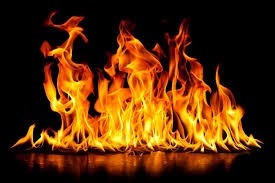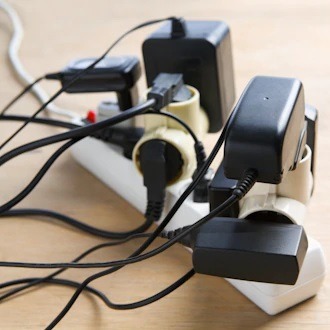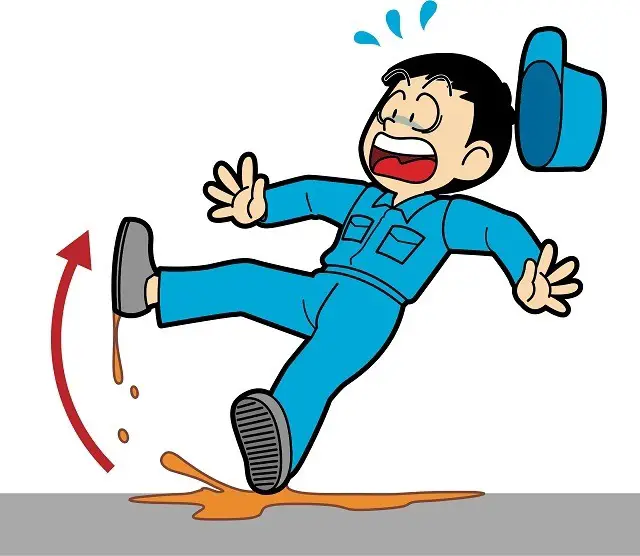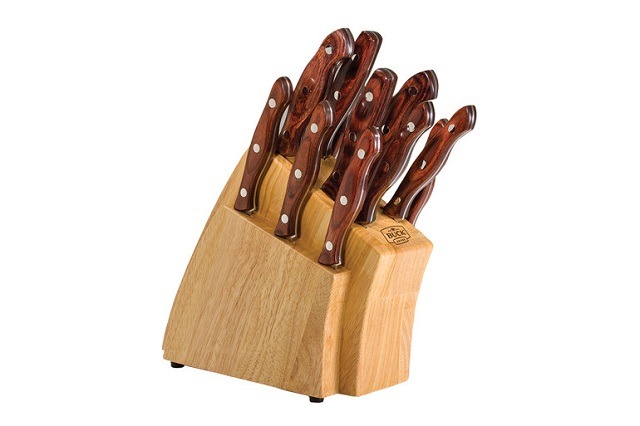16 Common Kitchen Hazards

Usually, the kitchen is, without a doubt, the most hazardous space in a home. Hot surfaces, sharp utensils, powerful appliances and heavy pots are all found in the kitchen.
If you don’t take the right safety measures when working around these items, then hazards are prone to take place.
Good sense is often enough for protecting homeowners, their kids and their visitors from any hazard that might arise in the kitchen.
By keeping counters and sinks clean, safe storage of items, keeping an eye on hot surfaces, and turning cookware handles inward when preparing food, you will prevent kitchen hazards.
Common Kitchen Hazards
Here are some common kitchen hazards you most likely have in your house right now:
-
Overloading circuits

Plugging lots of kitchen appliances into a single outlet will result in a catastrophe. Overloaded electric circuits can cause an inferno and also destroy your appliances.
Small kitchen appliances like toasters, blenders, crock pots and food processors may be fire hazards if you leave them plugged in.
Make sure you unplug the appliances when you’re not using them.
-
Loose hair and clothes
Long hair, long sleeves and loose clothing can be hazardous in your kitchen. Tie up long hair, tie the apron tight, and roll up sleeves before you cook.
Also be careful with other loose clothes like curtains, sheers and draperies within your kitchen. These can easily catch fire, especially if are usually blown by the wind and are situated near a source of fire.
-
Flammable materials near the stove tops
Don’t place flammables near your stove top; even if it is on. You should place food boxes, pot holders, dishcloths, wooden utensils, even paper towels away from your stove top.
Be careful with dishcloths during the cooking process as these can catch fire as you are holding your pots and pans.
The resulting fire may cause burns or even extend to an even bigger fire depending on the fuels around.
-
Kids in your kitchen
Most of the time, babysitters and mothers will often work in the kitchen and keep an eye on their kids at the same time. In this situation, negligence can result in a disaster.
One great safety measure you can apply is install a close by playpen where the kids stay within your eyesight, but far from kitchen hazards.
Do not over rely on your ability to multitask; it only requires taking your attention from your baby for a few seconds for hazards to kick in.
If setting up a playpen isn’t your choice, then safeguard your children by getting rid of tablecloths, storing heavy things securely and keeping knives and other sharp items away.
Use child locks to secure cabinets and unplug kitchen appliances when not using. Block your sockets to ensure children do not insert sharp objects into them.
-
Household chemicals
Most families keep cleaning products and household chemicals beneath the sink. This is hazardous, as kids may easily reach these household chemicals.
Most of these chemicals can be dangerous if not lethal if put on the skin or ingested. Rather, keep the items beyond reach in a locked cabinet where kids cannot get to them.
Ensure that you use the right chemicals for cleaning your dishes and cleaning appliances. Using poisonous substances can be dangerous.
Also, ensure that you thoroughly rinse off all cleaning chemicals from your utensils and appliances to ensure you are not ingesting residue chemicals with your food.
-
Storing food wrongly
It is hazardous to leave food on your counter to thaw since it lets bacterial multiply fast. You should plan ahead and offer your meals time to safely defrost in the fridge.
Unless you are defrosting a whole chicken, it should be okay moving food from the freezer to the refrigerator.
Do not refrigerate food again once it has been thawed; it is better to cook it and store it in your fridge while cooked.
-
Hot cookware
If you don’t handle cookware with hot food in the right way, scalding and burns can happen, particularly with active kids within your kitchen.
Make sure you turn cookware handles away from the stove’s edge to avoid them getting knocked off and burning you or your loved ones with their hot contents.
As much as possible, try and use back burners or move hot cooked food to the back burners or store it on a countertop where it is not easily reachable.
-
Poor fridge storage
If you don’t store raw meat in the right way, it can contaminate other food items in the fridge.
You should always store raw meat in sealed plastic bags or sealed containers to prevent contamination. Make sure you place them on lower shelves, not above veggies or fruit that you’ll not cook.
Avoid storing some vegetables with strong smells such as onions or garlic in your fridge, especially when they are cut into pieces.
As much as possible, store your food and groceries within containers or sealed bags. Do not keep any foods exposed within your fridge.
Poor food storage can cause food to go bad easily or provide a breeding ground for bacteria and bugs.
-
Kitchen fires
Since a kitchen houses lots of hot appliances, it’s easy for a bit of negligence to lead to unwanted flames. There are many ways that fires may occur in the kitchen:
- Grease fires are the most hazardous kind of fire and get ignited when grease inside a pan or pot gets very hot and catches fire. These fires frequently lead to an open flame that will spread fast and catch other things in the kitchen.
- Oven fires take place when the food you are cooking inside catches a flame. Usually, these are inside the oven, so similar to dry fries, oven fires are usually quite minor.
- Dry fire will take place when all the water boils out of a hot pan or pot and the food inside of it catches fire or scorches. Usually, these are minor flames that lead to a lot of smoke damage.
To protect yourself against fires in the kitchen, make sure you store all combustibles away from open fire. Also, you should always keep an eye on all heated surfaces in your kitchen.
Ensure you have a serviced fire extinguisher kept in a suitable place within reach, which can be a first line of defense in case of kitchen fires.
-
Wet floors

Many accidents in the kitchen take place because of wet floors so you should wipe any spillage, which happens right away and dry the floor.
Cordoning off specific sections and warning signs stating “wet floor” are deeds that you should consider before and after you mop the kitchen floor during cleaning up until its dry or after spillages.
Most of the time, it is damaged or loose floor tiles or a rough floor that are to blame for mishaps. For this reason, you should clean and maintain floors properly.
You should also make sure that corridors or any places where everyone may walk are obstacle free.
Electric wires from your appliances can result to serious falls when you trip over them, so ensure these are not placed along the paths.
-
Unattended gas flames
When you’re preparing food, interruptions are all over. However, when using a burner, don’t leave the fire unattended as it can lead to a fire.
A flame can easily be blown by the wind and spread to fabrics or other flammable items, then take on a life of its own from there.
12. Knives

Cuts and tears are frequent in the kitchen. The most frequent type of cut is the blade slipping while you’re cutting raw chicken or meat.
It’s followed by knife injuries from cutting your fruits and vegetables, such as when cutting onions, potatoes and apples. Always use top-quality blades which are well sharpened.
Unsecured cutting boards, wrong knife tactics and dull knives often cause cutting injuries.
For this reason, you should buy non-slip cutting boards or maybe slide a damp towel under the board to ensure that it’s secure.
In addition, make sure you keep your hands dry every time you’re cutting as this will give you a good grip of the knife and avoid slippages. Always hold the knife firmly.
-
Improper storage of sharp cutlery and utensils
The utensil drawer is probably filled with many sharp things, which may cause injury if grabbed wrongly.
Make sure you point sharp objects away from where your family may reach when going through the kitchen drawer.
Also, organize the drawers in an orderly way so your family knows where the sharp objects are. You should use a knife block to store sharp knives out of reach of kids.
-
Unattended food on your stove
Make sure you keep your eyes on a pot cooking on the stove. Don’t step out while you have something cooking in the oven or microwave.
This is especially hazardous if a fire takes place and you are not there to extinguish it fast. You should turn your appliance off if you need to leave the kitchen.
It is also not unusual to forget that you had something on your stove when you step away from the kitchen, only to get a wake-up call from your smoke detector or the smoke itself.
-
Filthy sponges
Dirty sponges will harbor disease-causing micro-organisms that will afterward spread on to the countertops or food.
Frequently microwave a damp sponge for approximately one minute to disinfect it. Make sure you don’t microwave a dry sponge, since it may ignite.
-
Dirty ovens
Most homeowners don’t like cleaning the oven, but it is essential. A filthy oven may cause fires while you’re cooking, letting grease or charred food to catch fire.
You should clean the oven frequently and always monitor food while it’s in the oven.
Keep these points in mind while you enter the kitchen next time, for a safer kitchen experience!
